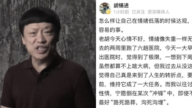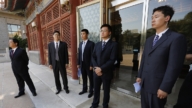【新唐人2011年10月27日讯】大陆广电总局“限娱令”正式发布。“限娱令”主要规范的是上星综合频道,由于央视除CCTV1之外,其他频道不在限制之列。广电总局的决定遭到了一些网民的抗议和专家的质疑。外界认为,央视本身就没有什么百姓喜欢看的娱乐节目,现在又限制娱乐节目的播出,这是通过文化限制,达到对民众的思想控制。
“限娱令”的核心内容包括:婚恋、涉案等七类节目,每家省级上星卫视必须设一档道德建设类节目,另外,各卫视在晚间7点半到10点的黄金时间,娱乐节目每周不能超过两档。全国每年选秀类节目不超过10档等。
北京文化评论员叶匡政表示,娱乐节目对政权没有任何威胁性。在今天全球化的时代,对娱乐限制,是荒唐的行为。
叶匡政:“我觉得现在电视已经成了一个相对比网路,相对其他媒体来说,已经变成了一个非常冷的媒体。那么其实现在电视真正能吸引人哪,吸引的这个群体,大多数为老年人,但是随着这种(限娱令)的颁布,我想,可能这种对年轻人的吸引也会慢慢减弱。我个人认为对娱乐的限制,实际上是一个很荒唐的行为。”
叶匡政认为,一个极权社会对思想的管制,首先是通过文化限制。
这次“限娱令”主要规范的是上星综合频道,由于央视除CCTV1之外,其他频道都属于“专业性”频道,所以不在限制之列。
叶匡政表示,中央电视台承担的是传达国家意识,或者表达中共的思想为主,央视很多娱乐节目是远离民众的。
而新唐人电视台评论员赵培分析,中共出这个限制令的目地,是因为现在中国人的思想,中共控制不住了,特别是大陆各个卫视台在拼收视率的带动下,开始引进港台的娱乐、综艺节目做法,也拓广了国人的兴趣,没人搭理中共的“主旋律”。
《法制晚报》报导,新办的新闻节目、道德建设节目,不太可能马上在收视率上与娱乐节目并肩,因此广告商的信心会受到冲击,短时期内卫视广告额应该会下滑。
叶匡政:“就是讲对中央电视台的广告收入,或者各个方面,它其实是一种保护。”
前北京大学教授焦国标则认为,娱乐节目可以不要那么多,只要有一个道德节目是好的,关键是能不能做到?
焦国标:“因为中国社会它的问题不在于说民众的道德,它实际上最重要是官德,是政府官员没道德的问题,不是老百姓没道德的问题。”
赵培认为,中国的道德丧失根源于信仰的丧失,特别是中共鼓吹极端的无神论,教育国人把物质利益当作第一位追求,升官看GDP、好学生看学分、一切向钱看等等。他说,败坏道德的恰恰是中共,不是娱乐节目。
新唐人记者周玉林、唐睿、王明宇采访报导。
“Entertainment Limit Order" Favors CCTV
Anchor:
China’s State Administration of Radio Film and Television (SARFT) issued an “Entertainment limit order” effective next January.
This order regulates integrated satellite channels.
This order does not affect state media CCTV much since CCTV1 is the only channel under CCTV that’s being limited.
This decision met with resistance as people complain online.
Experts also questioned the objectives of the decision.
People believe that the fact CCTV lacks real, enjoyable
entertainment programs is due a restriction in culture and a control
of public minds, especially now with the new regulation.
Please see our report.
Reporter:
The “Entertainment limit order" regulates 7 types of programs
which include marriage, crime, and so forth;
each provincial satellite TV has to have one program
on moral construction;
in addition, no more than two entertainment programs a week
between 7:30pm and 11:00pm.
No more than 10 competition types of programs a year
are allowed in the whole nation.
Political and cultural commentator Yeh Quanzhen,
indicated that entertainment programs do not impose any threat to the regime.
It is absurd to restrict entertainment in an era of globalization.
Yeh Quanzhen: “0035-0122 I think television has become a
relatively unpopular media comparing to internet or other media.
In fact, the elderly are mostly the ones watch TV now.
With this regulation, I think, the younger generation will also gradually lose their interest in TV.
I personally think that a restriction on entertainment is actually
very ridiculous."
Yeh Quanzhen believes that a totalitarian society controls minds
by cultural constraints at first.
The “Entertainment limit order" mainly targets
the satellite channels.
Other than CCTV1, all other CCTV channels are professional channels, and thus do not fall within the limit.
Yeh Quanzhen indicated that the CCTV is responsible for
conveying the regime’s ideas or expressing CCP’s intentions.
The majority of CCTV’s programs stray far from people’s needs.
New Tang Dynasty TV commentator Zhao Pei analyzed
the purpose of this regulation.
Nowadays the CCP can no longer control people’s minds.
In particular, all satellite programs compete in the ratings
with the introduction of entertainment programs
from Hong Kong or Taiwan
which have broadened people’s interest.
No one really cares about the CCP’s theme.
Domestic news reports commented that
the new news programs or ethics programs aren’t likely to
catch up to the ratings of entertainment programs.
Therefore, the advertisers’ confidence will be challenged.
TV advertising should decline shortly after
the new programs are launched.
Yeh Quanzhen: “0320-0324 It’s in fact protecting the CCTV,
in the advertising revenue as well as in other aspects."
Former Beijing University associate professor Jiao Guobiao
believes it’s doable without so many entertainment programs
as long as one good moral program is available.
The key is if it can be achieved.
Jiao Guobiao: “In the Chinese society, it’s not a question
of public morality, but rather the importance of official morality.
It is an issue of low official moral, not the general public. “
Zhao Pei said the loss of morals in China is rooted
in the loss of belief.
The extreme atheism advocated by the CCP has educated the
people to pursue material interests as the priority.
GDP determines the outlook of the career, grades define the
quality of the students, and look highly upon money.
He said that it is precisely the CCP, not the entertainment,
That has damaged the morals.
NTD Reporters Zhou Yulin, Tang Rui and Wang Mingyu.



























